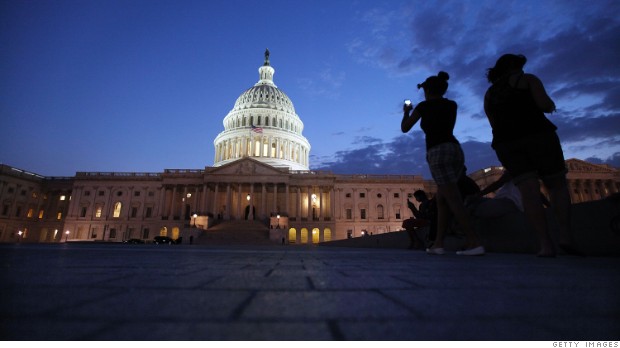
Congress has about two months before it must act to raise the debt ceiling, but lawmakers are showing few signs they are ready to act on it soon.
NEW YORK (CNNMoney)
Congress will have to raise the debt ceiling soon, probably by late February or early March.
The deadline sets the tables for another fight on Capitol Hill, where some Republican lawmakers view the debt limit as leverage in negotiations with President Obama over spending cuts and reforms to Medicare and Social Security.
The debt ceiling is a law that goes back to the early 1900s that caps how much debt the federal government can hold.
Last week, Treasury Secretary Tim Geithner warned Congress that federal borrowing would hit the $16.394 trillion debt ceiling on Monday.
Treasury can then buy the government about $200 billion of borrowing headroom by temporarily shifting how some U.S. holdings are invested. With the public debt increasing about $100 billion a month, that gives Treasury about two more months to borrow and stay under the cap.
Geithner ruled out "fire sale" sales of stock it still owns in companies bailed out during the financial crisis; he also said it made no sense to raise money by selling gold held in U.S. reserves.
Last year, political brinksmanship over the debt limit led to the downgrade of the country's credit rating, roiled stock markets and raised questions about the country's willingness to pay all of its bills on time.
In fact, the debt ceiling has long pitted Congress and the White House, regardless which party controls each branch of government.
It shouldn't be such a divisive issue.
While the Treasury secretary runs the government bond-selling operation, and the president appoints the Treasury secretary, the debt is ultimately racked up because of budget decisions made by Congress in partnership with the president.
In other words, Congress authorizes spending on Program X in a budget the president signs off on. If there's not enough tax revenue coming in to pay for Program X, the Treasury Department goes out and borrows money to pay for it.
The debt ceiling is an artificial limit on the debt -- not a trip wire on spending.
"The debt limit does not restrict Congress's ability to enact spending and revenue legislation," the Government Accountability Office wrote in a report last year. "[I]t restricts Treasury's authority to borrow to finance the decisions already enacted by Congress and the president."
That GAO report chronicled how the 2011 debt ceiling fight wasted $1.3 billion in taxpayer money because of the uncertainty it wrought on the complex task of federal borrowing. ![]()
First Published: December 31, 2012: 2:14 AM ET
Anda sedang membaca artikel tentang
Debt ceiling is the next fiscal cliff
Dengan url
http://bugarasakti.blogspot.com/2012/12/debt-ceiling-is-next-fiscal-cliff.html
Anda boleh menyebar luaskannya atau mengcopy paste-nya
Debt ceiling is the next fiscal cliff
namun jangan lupa untuk meletakkan link
Debt ceiling is the next fiscal cliff
sebagai sumbernya
0 komentar:
Posting Komentar